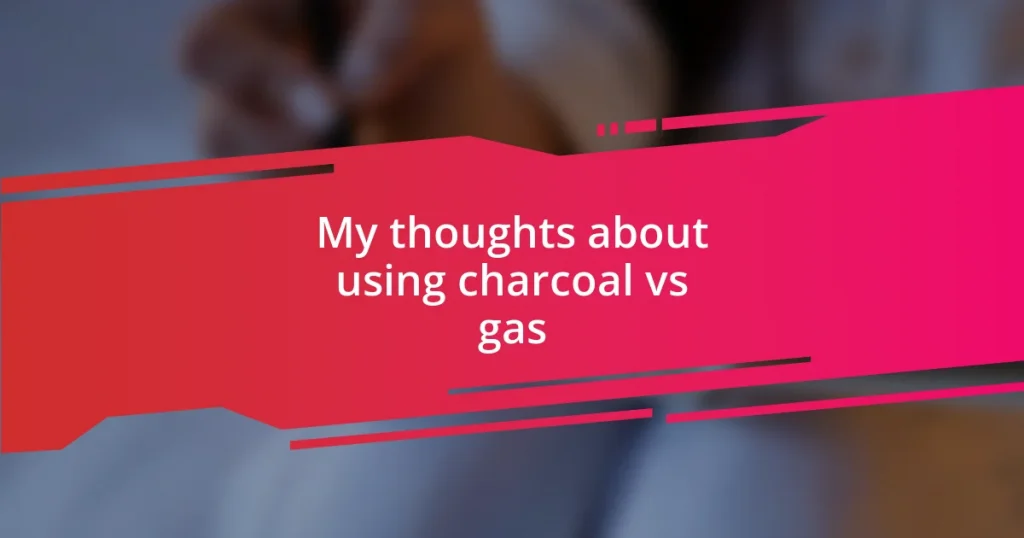Key takeaways:
- Charcoal grilling offers enhanced flavor and a hands-on cooking experience, while gas grilling provides convenience, quick start-up, and precision temperature control.
- Cost-wise, charcoal grills are generally cheaper upfront but incur ongoing fuel costs, whereas gas grills have a higher initial investment but can be more economical over time.
- Ultimately, the choice between charcoal and gas hinges on personal preference, balancing the rustic charm of charcoal with the modern ease of gas grilling.
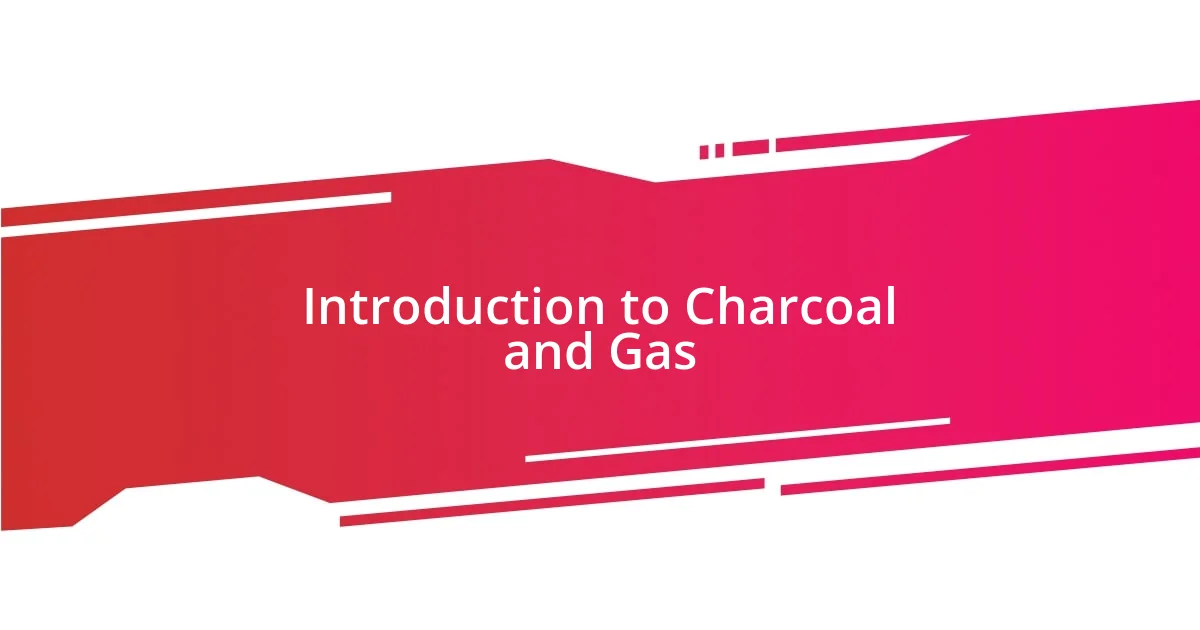
Introduction to Charcoal and Gas
When it comes to grilling, the choice between charcoal and gas often ignites a passionate debate among enthusiasts. I still remember the time I decided to host a barbecue using charcoal for the first time. The smoky aroma filled the air, and I felt a sense of nostalgia for the countless backyard gatherings from my childhood. With charcoal, there’s something inherently primal about the process, as if you’re connecting with the very essence of cooking.
On the other hand, gas grilling offers its own unique advantages. I once had a friend who swore by his gas grill; it was definitely more convenient, allowing for rapid heat adjustments and quick start-up times. Have you ever been the one waiting for charcoal to light while your guests are eagerly anticipating their meal? It’s a feeling I know all too well, and with gas, that impatience disappears.
Ultimately, both options have their merits, and the choice often boils down to personal preference and lifestyle. I’ve found myself pondering whether the ritual of charcoal grilling outweighs the efficiency and ease of gas. What about you? Have you experienced the joy of grilling with charcoal, or does the simplicity of gas resonate more with your cooking style? Each method carries its own charm, waiting to be explored in your culinary adventures.
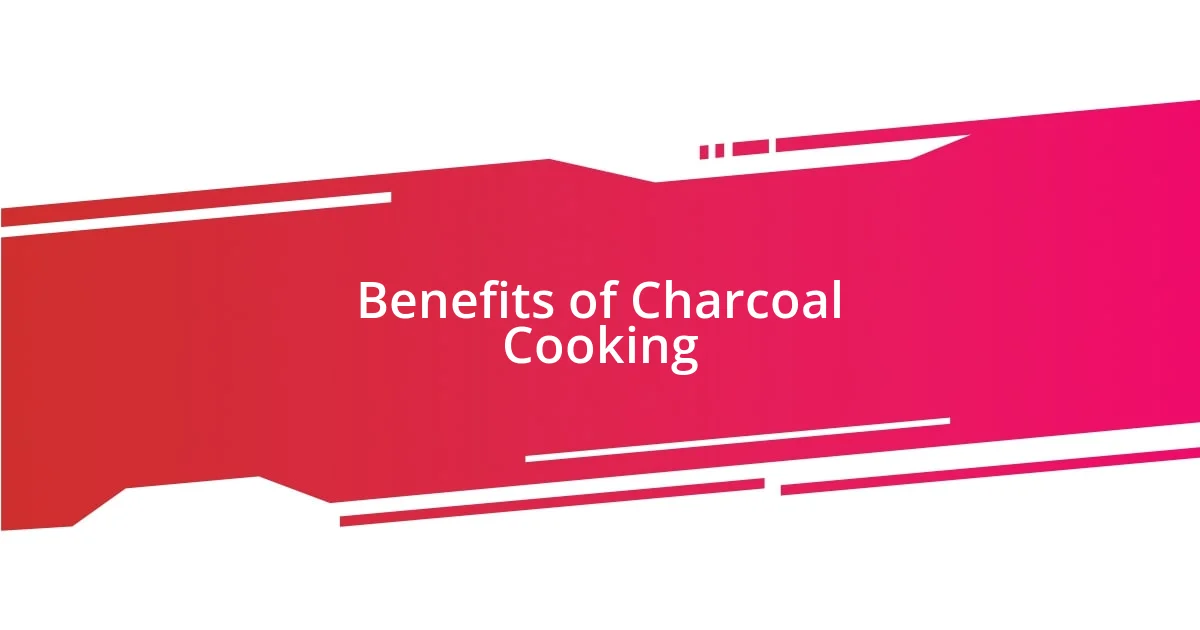
Benefits of Charcoal Cooking
There’s something magical about cooking with charcoal that ignites all the senses. For instance, I remember the thrill of lighting my first charcoal briquettes and watching as they glowed amber, slowly transforming into a sea of hot coals. That slow build-up creates an anticipation that’s almost akin to a campfire—a communal experience that brings people together. The distinct smoky flavor you get from charcoal is often unparalleled, adding depth to meats and veggies that makes every bite memorable.
Here are some key benefits of charcoal cooking that enhance the grilling experience:
- Enhanced Flavor: The smoke from burning charcoal infuses food with a rich, smoky flavor that’s hard to replicate.
- High Temperatures: Charcoal can reach higher temperatures than gas, perfect for searing meats to lock in juices.
- Versatility: It’s great not just for grilling but also for smoking and indirect cooking, allowing for various steaming methods.
- Authentic Experience: There’s a unique satisfaction in managing coals and mastering the temperature, creating a hands-on culinary adventure.
- Cost-Effective: Charcoal grills tend to be more affordable upfront compared to gas grills, making them accessible for many cooks.
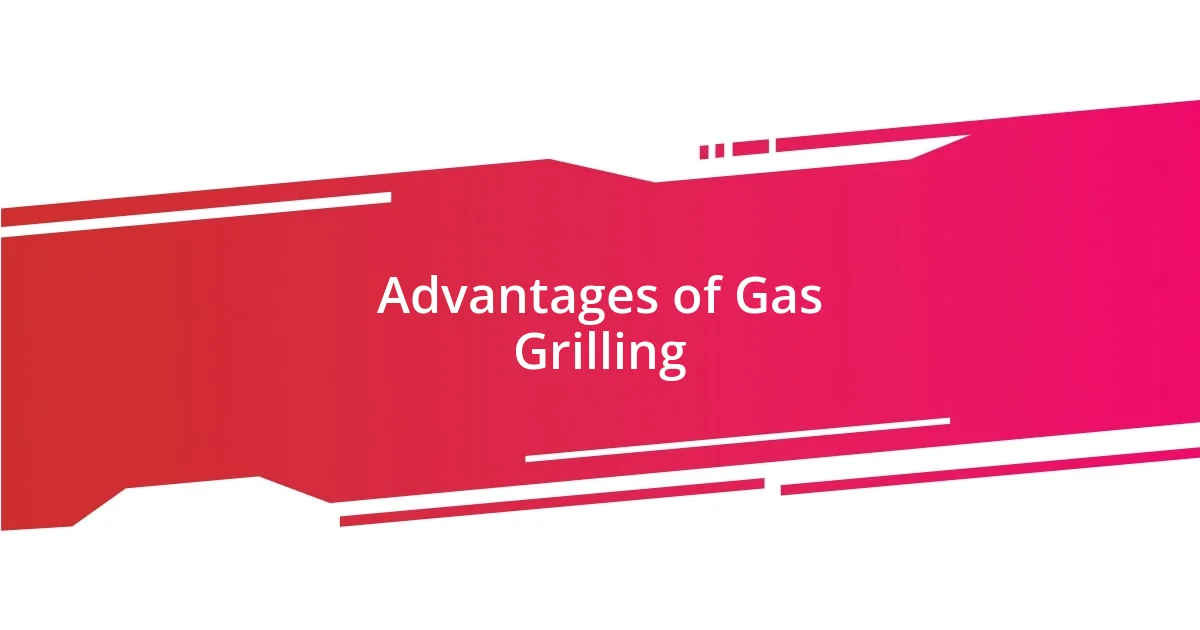
Advantages of Gas Grilling
When it comes to the advantages of gas grilling, one of the standout features is the convenience it offers. I remember hosting a last-minute cookout, and the ease with which I could fire up my gas grill was a lifesaver. In just a few minutes, I had a perfectly preheated grill, ready for juicy burgers and hot dogs. No lighter fluid or waiting for coals to ash over—just instant satisfaction. This quick-start ability is especially appealing when you’re juggling guests and want to impress without the wait.
Another major perk of gas grilling is the level control it provides. I love that I can dial up or down the heat with precision as I cook. Just last weekend, I was preparing delicate fish fillets; having the ability to maintain a consistent temperature made a world of difference. This kind of control not only reduces the chances of burning food, but it also allows for more creative dishes. Have you ever tried grilling vegetables at a lower heat to bring out their sweetness? It’s a game changer!
Lastly, gas grills tend to be easier to clean than their charcoal counterparts. I recall the chaos of cleaning up after a charcoal grill—ashes everywhere and a dirty grate to scrub. With gas, it’s just a quick wipe-down, allowing for more time to relax and enjoy the meal with friends. The simplicity of cleanup means I can spend more time with my loved ones rather than doing the dishes, which, in my book, is a substantial advantage!
| Advantage | Description |
|---|---|
| Convenience | Quick start-up with no need to wait for coals. |
| Temperature Control | Easily adjustable heat settings for precise cooking. |
| Easy Cleanup | Less mess and simpler maintenance compared to charcoal. |

Comparing Flavor Profiles
Charcoal undeniably brings a unique flavor that truly elevates grilled foods. I can vividly recall a barbecue where I marinated ribs overnight. When I tossed them onto the hot coals, the smoky aroma filled the air, teasing my taste buds long before the first bite. That charred crust? It wasn’t just about looks—it was a burst of flavor that gas just can’t replicate. Isn’t it fascinating how much the cooking method can enhance the taste?
On the flip side, using gas offers a more subtle, clean flavor. I remember trying to grill chicken breasts on a gas grill, where the slight caramelization from the burners still provided a satisfying taste, albeit not as robust. The simplicity of gas allows for the ingredients’ natural flavors to shine through. Have you noticed how with gas, you might get a gentle hint of flame, but it tends to lack that bold, smoky essence? It’s a different experience, one that leans towards showcasing the food rather than masking it.
Ultimately, the choice between charcoal and gas feels like a personal journey through taste rather than just convenience. Personally, I treasure those moments when the smoky notes from charcoal linger in my memories, connecting me to the outdoor gatherings of my youth. Yet, I also appreciate the elegance of gas for quick weeknight dinners when time is scarce. Which profile do you find more appealing for your culinary adventures? Each has its place, and the flavor profiles reflect a deeper connection to the cooking experience itself.

Cooking Times and Control
When it comes to cooking times, there’s a noticeable difference between charcoal and gas. I’ve often found that charcoal takes longer to reach optimal cooking temperatures. There’s that wait time you simply can’t skip, which sometimes leads to impatience—especially when you’re hungry! Do you know the feeling of eagerly checking the coals, hoping they’ve finally ashed over? It feels like a lifetime, doesn’t it?
On the other hand, gas grills allow for a quicker start and easier temperature adjustments during cooking. I’ll never forget the time I had friends over, and I was grilling steak. With a flip of a knob, I could raise the heat to sear the meat beautifully while simultaneously lowering it for the sides. That precision gives me a sense of control that I really appreciate. Have you ever tried adjusting heat mid-cook? It’s empowering to know you’re in charge.
Charcoal can deliver some exciting results, but timing and control can be a bit of a guessing game. I vividly recall a BBQ where I misjudged the coal’s heat and ended up with burgers that were burnt on the outside but raw on the inside. It was a lesson in the unpredictable nature of a charcoal grill! Given my experiences, I find gas grilling tends to deliver those perfectly cooked dishes with less anxiety. Don’t you sometimes wish for that peace of mind while grilling?

Cost Considerations for Each
When weighing the costs of charcoal versus gas grilling, it’s essential to consider both initial and ongoing expenses. Charcoal grills typically have a lower starting price, which can be enticing for beginners. I remember purchasing my first charcoal grill for a mere $100, and it’s served me well over the years. However, what I didn’t factor in was the continuous need for charcoal, which can add up over time. Have you ever calculated how much you spend on fuel?
In contrast, gas grills often carry a higher upfront investment, with some models easily exceeding $500 or more. Yet, I’ve found that they can be more economical in the long run. The convenience of hooking up a propane tank or running on natural gas means I’m not constantly buying bags of charcoal. Plus, the efficiency of gas can actually reduce the overall cost per grilling session. I still recall the first time I filled a propane tank; it felt like a small victory knowing I wouldn’t have to deal with embers for a while. Isn’t it relieving when a simple choice makes life just a bit easier?
Maintenance costs also play a critical role in your decision. Charcoal grills often require more upkeep due to ash accumulation, which I learned the hard way during my first summer of grilling. I spent hours cleaning out ashes—not my idea of a fun evening! Gas grills, while requiring occasional cleaning, generally come out on the easier side. How much value do you place on the time saved in cleanup? For me, that’s a significant factor, especially on busy weekends when I just want to enjoy the food with friends instead of laboring over the grill.
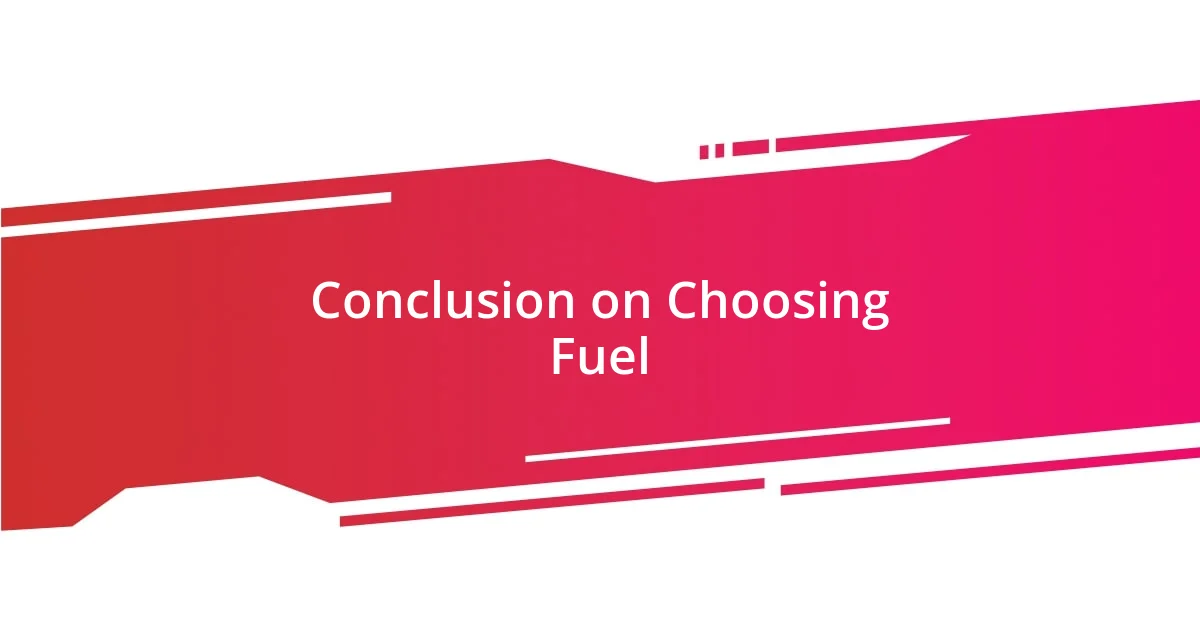
Conclusion on Choosing Fuel
Choosing between charcoal and gas as your grilling fuel can feel overwhelming, especially when you reflect on your personal experiences. I remember vividly my first summer grilling with charcoal; the smoky flavor was unbeatable, but the long wait for the coals to heat up tested my patience. Don’t you ever think about how those minutes could be spent enjoying a drink or socializing with friends instead of staring at the grill?
On the flip side, gas grilling has its advantages that often resonate with convenience lovers like me. One evening, I pulled out my gas grill for an impromptu cookout. With just a twist of the knob, I was up and running within minutes. That ease of use gave me more time to connect with my friends rather than fussing over flame management. Isn’t that what we all want during gatherings—a seamless cooking experience that lets us focus on the company rather than the grill?
Ultimately, the choice often boils down to what you value more: the rustic charm of charcoal or the modern convenience of gas. Reflecting on my own preferences, I lean towards gas for its quick setup and consistent heat, but I still cherish the nostalgic moments when charcoal takes center stage. What do you prioritize in your grilling adventures—flavor, convenience, or the social aspects of cooking outdoors?










